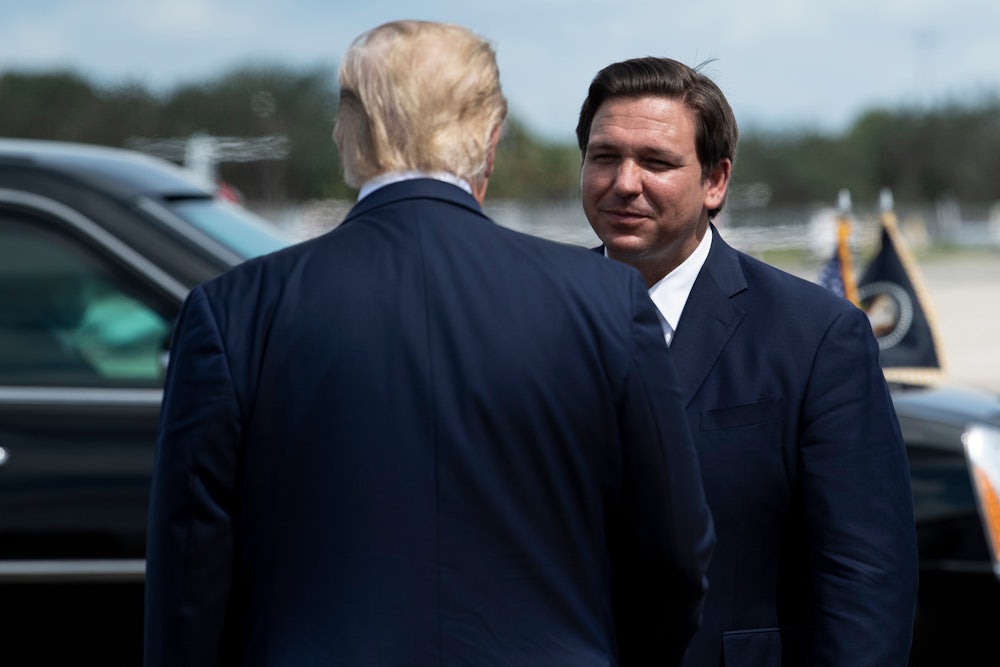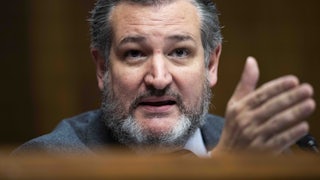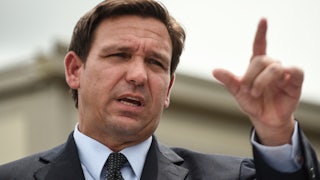For former President Donald Trump and Florida Governor Ron DeSantis, this week’s Conservative Political Action Conference has an outsize level of importance. That’s because the annual CPAC straw poll will almost certainly more closely pit the two would-be 2024 presidential candidates against each other—offering the most direct comparison yet of which Republican is favored by some of the most active Republicans in the party.
The straw poll, which will be held Sunday, will likely exacerbate brewing tensions between DeSantis and Trump. Both men are exceptionally popular within the party. But what’s interesting is that in a party whose devotion to Trump has been nothing short of slavish, DeSantis has been the only figure willing to step forward to challenge Trump’s positions. It’s a given that the two will poll at the top. The bigger question is how close they are and what the ripple effect of that will be.
“I’m going to make a bold prediction for you: Trump wins overwhelmingly. DeSantis comes in second. The question would be how overwhelmingly, and if there will be chatter or noise that comes into play during the convention,” said Florida-based Republican strategist Brett Doster.
Comparisons between Trump and DeSantis have been going on for a while. Over the last few years, the first-term Florida governor has crept up just behind Trump or even surpassed him in informal surveys and straw polls of Republican activists. When Trump is not on the ballot, DeSantis tends to be the clear front-runner for the 2024 Republican presidential nomination. That’s led Trump to watch DeSantis warily and grumble to aides about DeSantis’s refusal to say he would not run for president if Trump ran for president in 2024. Most other Republicans have made that promise. The difference is DeSantis hasn’t, and early indicators are that DeSantis would be the only Republican with a serious chance of beating Trump.
It wasn’t always this way. Once upon a time, DeSantis ran in the most pro-Trump circles available to a member of Congress. When DeSantis was a member of Congress from 2013 to 2018, representing the eastern Florida coast, he was part of the hard-right and very pro-Trump House Freedom Caucus (as was Trump’s last chief of staff, Mark Meadows). When DeSantis ran for governor in 2018, he wasn’t the front-runner at first. But he was running in a year when a Trump endorsement could put a Republican candidate in the lead. So he appealed to Trump by frequenting Fox News. DeSantis ran ads showing him reading to his children about Trump’s escapades and even got them to chant “build the wall” in one ad. It all paid off. He got Trump’s endorsement. DeSantis then won the nomination and squeaked by Democrat Andrew Gillum in the general election.
The popular Florida governor is literally where he is now in part thanks to Trump. Trump has noted this, grumbling, according to a forthcoming book, that he “helped Ron DeSantis at a level that nobody’s ever seen before.” But since DeSantis assumed the governorship of a large state that’s an obvious launching pad to the White House, he hasn’t worked to stamp out 2024 speculation.
Early on, Trump tried to quash the prospect of the Florida governor eclipsing him by floating him as a vice president. That didn’t do it though. DeSantis didn’t defer to Trump, effectively allowing DeSantis 2024 chatter to continue. Murmurings of DeSantis becoming the party’s standard-bearer in 2024 have continued as he has carved a name for himself as a young Yale-educated former Navy Seal with a penchant for opposing mask mandates. DeSantis’s tenure as governor has been marked by his hardened resistance to mask mandates and battles with school districts. He’s supportive of a proposal that would cut $200 million in funding from counties that did not follow his school mask mandate ban last year. He proposed a special police force to monitor elections. He is one of the most high-profile Republican elected officials to publicly misconstrue critical race theory, calling it “state-sanctioned racism” (it is not). The state’s vaccination rate is currently around 66 percent, hardly the worst in the United States but far lower than in states like Vermont, Massachusetts, or Maryland, which all have Republican governors and vaccination rates above 70 percent.
DeSantis generally digresses when asked about running for president or some kind of brewing proxy war between himself and Trump. DeSantis has said any friction between the two is “total bunk.”
Nevertheless the reports of tensions have persisted. The feuding spilled into public view when DeSantis refrained from saying whether he had gotten a Covid-19 vaccine booster shot and Trump, in response, referred to the Florida governor as “gutless.” (Trump said publicly that he did get a booster, an announcement greeted with scattered boos at a public appearance last year.) Trump has also reportedly wondered to aides why DeSantis won’t endorse him for reelection. He’s described DeSantis as “dull,” echoing a common critique among the Florida governor’s detractors.
Clearly the former president is unsettled by DeSantis’s effective refusal to kiss the king’s ring. Every poll of Republican primary voters or straw poll of activists further pits the two Republicans against each other. And the number of contests and measurements before presidential campaign season begins is small. So for both DeSantis and Trump, when they go to CPAC, the straw poll’s outcome will drive the narrative of their own friction. DeSantis will be speaking on Thursday, and Trump will get top booking as the headline event on Saturday night (the conference goes from Thursday through Sunday). Other possible presidential contenders like Marco Rubio and Ted Cruz will be speaking throughout the conference, alongside some of the most antagonistic figures in American politics: Candace Owens, Representative Lauren Boebert, and Representative Madison Cawthorn. Former Democratic Representative Tulsi Gabbard is speaking as well, for some reason.
The CPAC straw poll is an indicator of momentum and the temperature of some of the party’s most rabid activists, but one thing it isn’t is a very good predictor. Since 2009, the only straw poll winner to go on to win the Republican nomination was Mitt Romney, in 2012. Nearly every other winner in over a decade—Ron Paul, Rand Paul, and Ted Cruz, to name three—have not won the GOP nomination.
But the winner of the poll is generally regarded as the leader of an energized side of the Republican Party. It provides a level of legitimacy a candidate might otherwise not have. “I think if DeSantis wins, it’s a shock wave for Trump, and I think DeSantis would be ahead of schedule,” a former top adviser to Senator Marco Rubio told me.
For a figure like Trump, whose political fortunes and own ego depend on whether he’s considered the supreme leader of the Republican Party, he needs two things to happen ahead of 2024. He needs to illustrate that he still holds an undeniable iron grip on the Republican Party, and he needs to show his endorsements can install a Republican in elected office. Trump has endorsed over 100 Republican candidates running for elected office this cycle, including 13 candidates in Senate races and 53 candidates in House races. He still hasn’t endorsed in some of the biggest Republican races of the cycle, such as Arizona, Ohio, and Missouri. Most of his endorsements have gone to Republicans who have questioned the legitimacy of the 2020 presidential election.
Most of the candidates Trump has endorsed in past cycles have gone on to win their nomination contests, but that does not necessarily reflect a special savvy on Trump’s part. Sometimes he endorses when it’s clear a candidate will win. A snap analysis of Trump’s win-loss endorsement ratio after the 2018 midterms found that 58 percent of the candidates he endorsed won their races. A separate analysis by The Washington Post found his endorsement-to-victory ratio more evenly split.
For DeSantis, the situation is different. Being considered a front-runner this far ahead of a presidential election is almost always the kiss of death. “Nobody wants to be the front-runner this far out. A lot of things can change,” the former Rubio aide told me.
DeSantis also has to win reelection this fall. Two Democrats are running, Charlie Crist and Nikki Fried, who could conceivably give DeSantis a tough race. And he may not enjoy Trump’s endorsement this time around if their connection remains strained. At the same time, DeSantis has shown he might be one of those rare Republicans who don’t need Trump’s backing to raise money or rally support. He has amassed a war chest of $70 million through both small donations and the admiration of Republican megadonors. The trick for DeSantis with the straw poll is to come out of it prominent but not too much of a threat to Trump right now, Brett Doster said.
“If Trump doesn’t run, DeSantis will be top tier, possibly winning the nomination,” Doster said. “People just love the guy. But DeSantis doesn’t want a food fight with Trump. Nobody wants a food fight with Trump. If he runs again, he’s going to win” the nomination.
Sometimes the CPAC straw poll is just a gauge of super-early activist support. This time around, the stakes are much higher. It will help show whether Trump is still the ultimate authority within the Republican Party or if Trump fatigue is finally seeping into the Republican base. That’s been Trump’s greatest fear since he started running for president in 2016—that people would stop taking him seriously at some point. Trump may not despise DeSantis, but he clearly despises what DeSantis represents: a new chapter for the Republican Party that doesn’t involve Trump.








